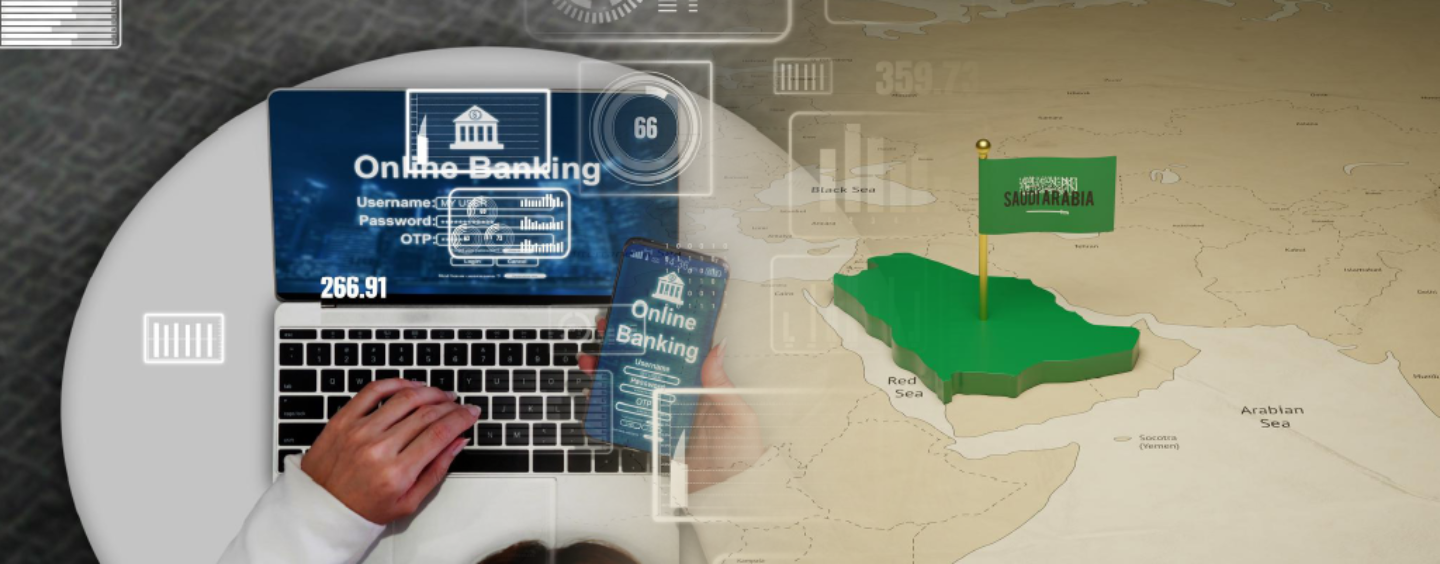
Saudi Arabia: Fintech Momentum to Continue in 2023 Driven by Open Banking and Digital Banking
28. November 2022In Saudi Arabia, the fintech industry has risen significantly over the past year, a growth that’s evidenced by accelerated new business creation and soaring investment activity. In 2023, the momentum is expected to continue, building on new regulations, supportive initiatives and favorable developments in the fields of open banking and digital banking, a new report says.
The Fintech Saudi Annual Report 2021/2022, released last week by Fintech Saudi, a body introduced by the Saudi Arabian Monetary Authority (SAMA) to support the development of the local fintech ecosystem, takes a look at the evolution of the domestic fintech industry over the past year, sharing the key trends that have emerged and what stakeholders should expect this year onward.
According to the report, the Saudi fintech industry has risen sharply this year, amassing 147 active companies as of mid-2022. The number represents a 79% increase from last year and a 14.7-fold increase since 2018, showcasing how fast the fintech startup ecosystem has grown in just the span of four years.
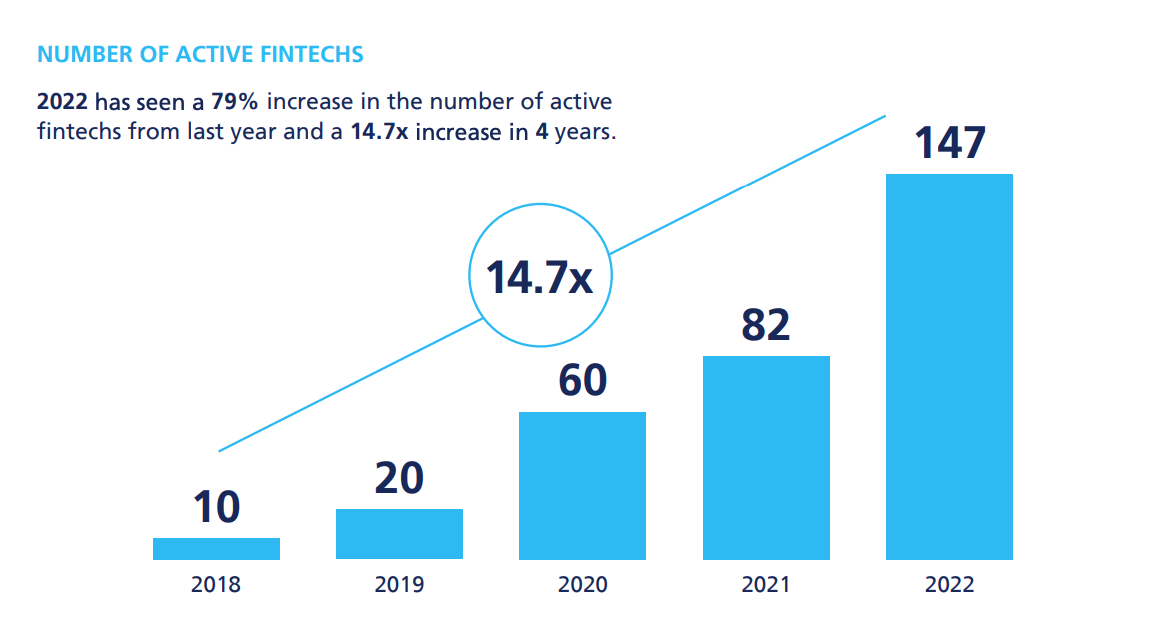
Number of active fintech companies in Saudi Arabia, Source: Fintech Saudi Annual Report 2021/2022, Fintech Arabia, 2022
Taking a deeper look into the main fintech categories, the research found that growth in 2021 and 2022 was particularly sharp in the infrastructure segment, with the number of companies in the space soaring 600% over the past year.
That rise, according to Fintech Saudi, can be explained by the anticipation of new open banking regulations, a favorable development that subsequently led to the entry of new players seeking to tap into the nascent sector.
After infrastructure, personal finance and treasury management (175%) saw the second strongest rise, followed by capital market (129%), and private fund raising (125%).
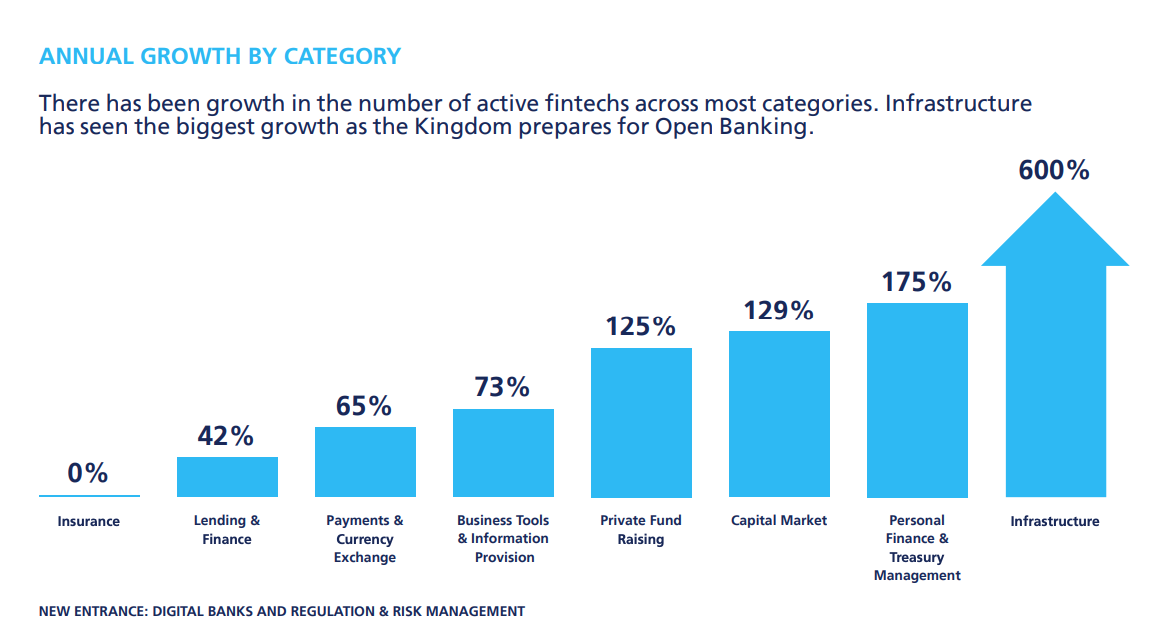
Annual growth in the number of active fintech companies across major categories, Source: Fintech Saudi Annual Report 2021/2022, Fintech Arabia, 2022
In addition to new business creation, fintech investments also recorded a strong year 2021 and 2022. Between September 2021 and August 2022, over SAR 1.5 billion (US$400 million) in funding were invested through 20 fintech deals, a sum representing a 11% increase from the previous year.
Notable deals during the period included Foodics (SAR 637.5 million or US$169.6 million), Tamara (SAR 375 million or US$99.8 million) and Hyper Pay (SAR 138 million or US$36.7 million) and Lean (SAR 123.75 million or US$32.9 million).
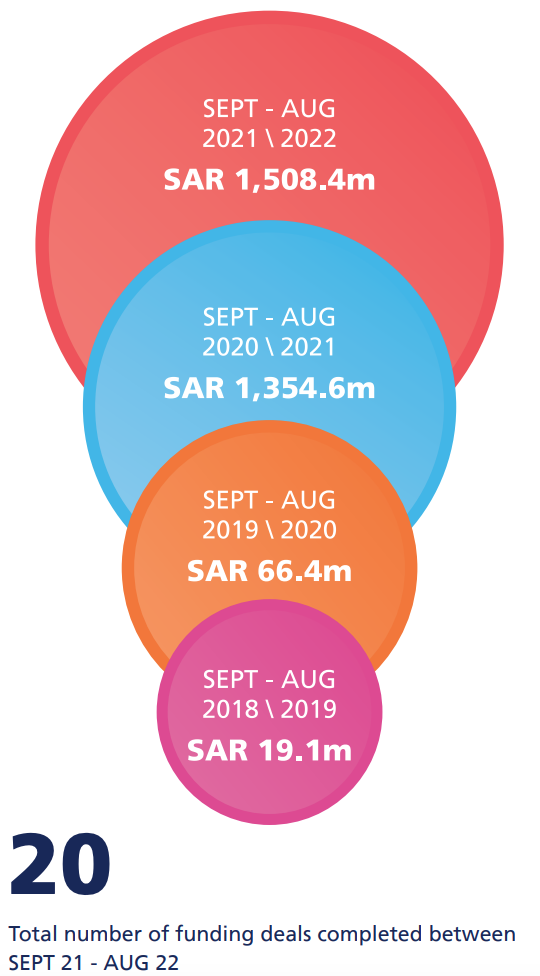
Fintech funding in Saudi Arabia, Source: Fintech Saudi Annual Report 2021/2022, Fintech Arabia, 2022
Trends to look out for in 2023
Building on the rapid growth of the Saudi fintech industry over the past year, 2023 is expected to be another year marked by innovation and developments. This momentum will be driven by the forthcoming launch of three new digital banks, new open banking regulations, and the implementation of the Fintech Strategy, the report says.
In 2021 and 2022, three entities were approved for a digital banking license in Saudi Arabia, the report notes. When launched, these new players will shake up the banking industry by providing customers with a larger range of options, widening financial access and driving innovation across the broader financial sector, it says.
STC is currently converting all its activities and functions from an e-wallet to a digital bank. The e-wallet has eight million retail customers and more than 120,000 merchants within its network.
Saudi Digital Bank, which was established by a consortium led by Abdul Rahman bin Saad al-Rashed and Sons Company, will target both the retail and small and medium-sized enterprise (SME) customers. The digital bank will run on a cloud-native infrastructure and will focus on providing hyper-personalized financial services and products.
Finally, D360 Bank, a shariah-compliant digital-only bank, will be targeting the underserved segments, focusing on addressing customer pain-points, building a strong community and leveraging innovation and technology to make banking convenient, accessible and fair to all.
In addition to the forthcoming launch of Saudi Arabia’s new digital banks, new open banking regulations are also set to give the fintech sector a boost.
Earlier this month, SAMA issued the Open Banking Framework, comprising a comprehensive set of legislation, regulatory guidelines and technical standards to enable banks and fintech companies to provide open banking services. The first services are expected to be launched in Q1 2023.
The Open Banking Framework is one of the key outputs of the Open Banking Program, which seeks for all banks in the country to adopt open banking.
The program is itself part of the newly approved Fintech Strategy, a national plan that strives for Saudi Arabia to become one of the leading countries in the field of fintech.
Ambitions of the Fintech Strategy include increasing the number of fintech companies operating in the country to 525 and increasing the number of fintech jobs to 18,000 by 2030. It also aims for total cumulative venture capital (VC) investments to surpass SAR 12.2 billion (US$3.2 billion) and direct gross domestic product (GDP) to reach SAR 13.3 billion (US$3.5 billion).
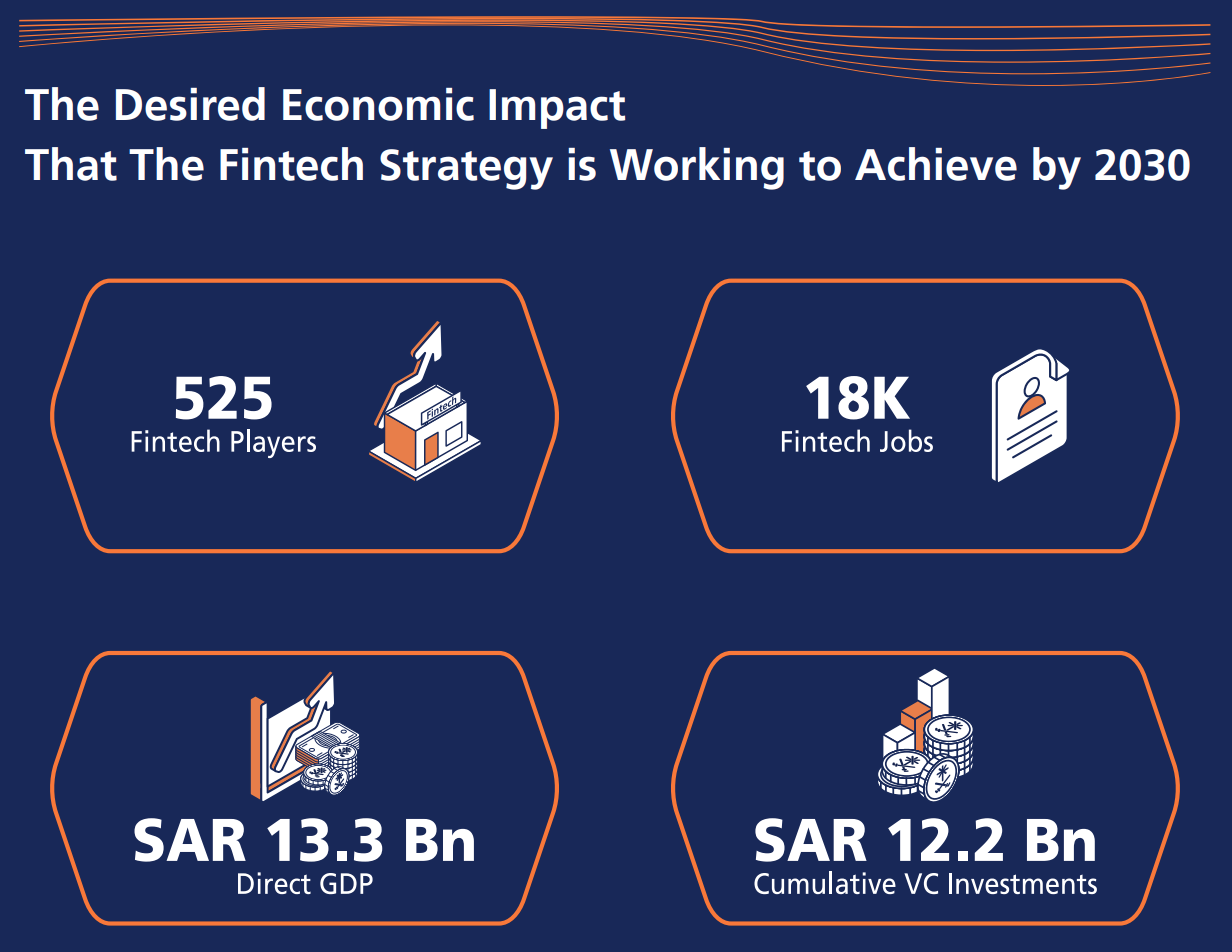
The desired economic impact that the Fintech Strategy is working to achieve by 2030, Source: Fintech Saudi Annual Report 2021/2022, Fintech Arabia, 2022
Saudi Arabia is home to a dynamic fintech startup ecosystem that’s led by payments and currency exchange companies. The category is currently the largest fintech segment, accounting for 30% of all registered fintech companies in Fintech Saudi’s database. Payments is followed by lending and finance (19%), business tools and information provision (13%), and personal finance and treasury management (11%), the Fintech Saudi report says.
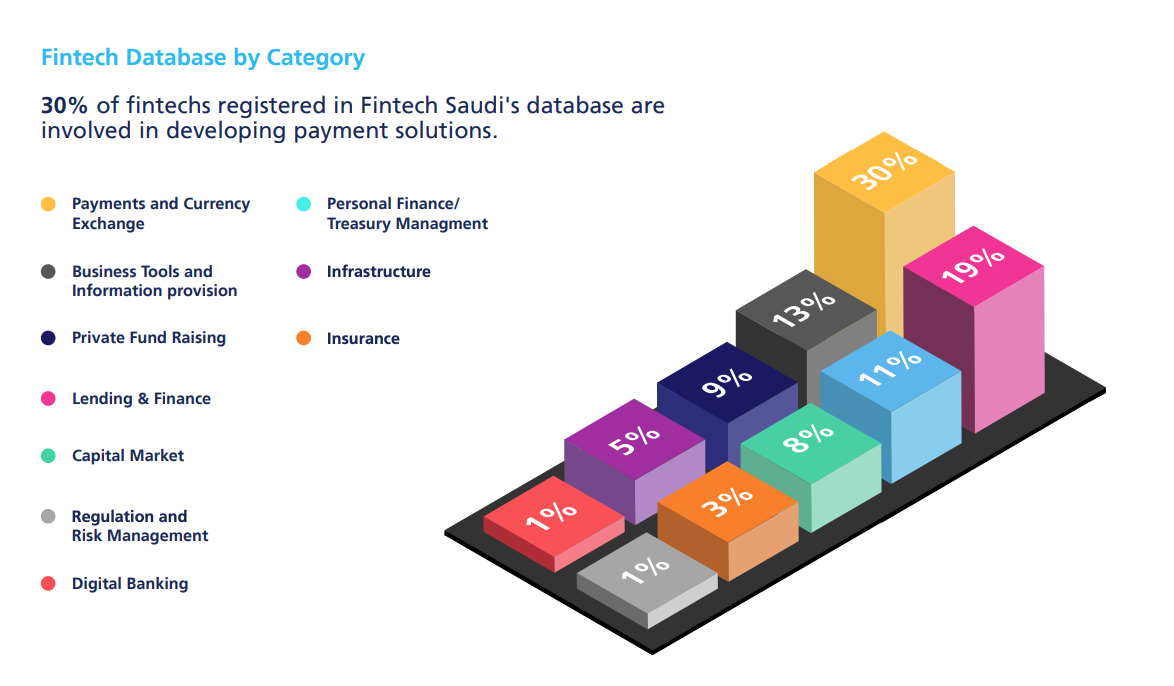
Fintech Saudi database by category, Source: Fintech Saudi Annual Report 2021/2022, Fintech Arabia, 2022







No Comments so far
Jump into a conversationNo Comments Yet!
You can be the one to start a conversation.